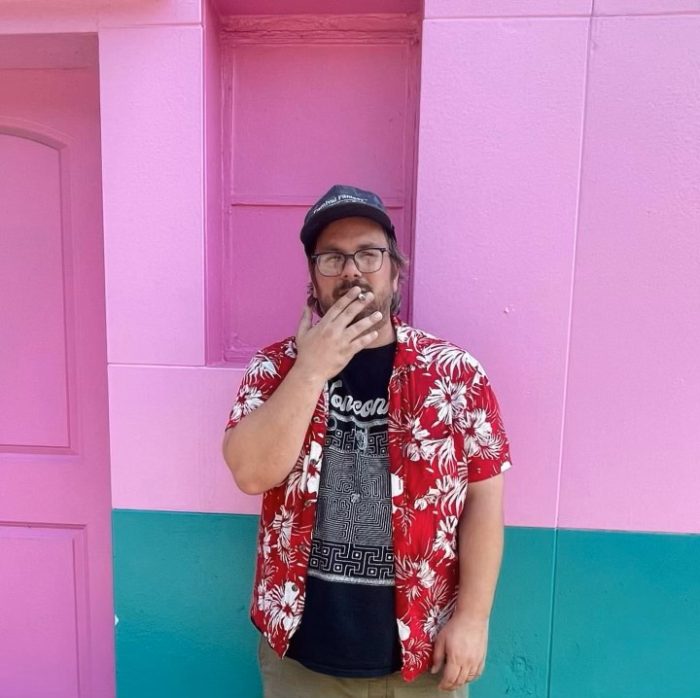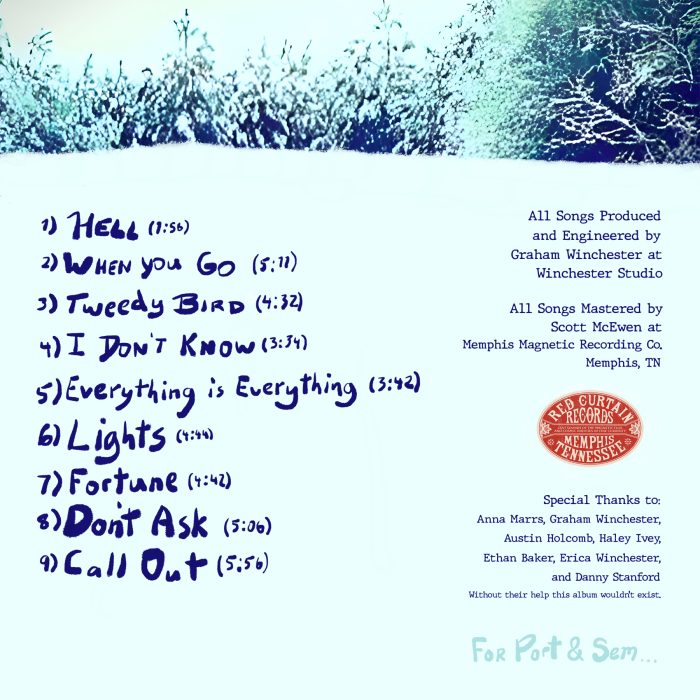‘EVERYBODY WANTS TO GO HOME’ Let these stories of ghosts take you anywhere

FROM the city of Memphis an album of supreme beauty, undeniably forged from pain, but ultimately blessed by the spirits of the Mississippi greats.
Available now, ‘Everybody Wants To Go Home’ (Red Curtain Records) is the debut, solo long player from Memphian, CHEYENNE MARRS.
The album is crafted together with near magical prowess. A gut-wrenching, emotional journey alternating between life’s lows and euphoric highs, but at the same time, providing a signpost towards the brighter tomorrow’s we all deserve.
“It was a very chaotic time when the album was being recorded, lots going on, you know like death and newfound love, a sense of the dark and the light,” explains Marrs.
“We made it in my friend Graham Winchester’s home studio and at first it felt like we were just together making a few songs, then it was like OK, let’s make the whole record. And by the time we were done, it was like we had something pretty special. It felt cool because everything fitted together, but it wasn’t like a contrived piece, it almost accidentally fitted, but I’m glad it did, and I liked the way it came naturally and didn’t feel forced.
“Me and Graham would meet up at his house and before we would even record, we’d talk for an hour about whatever, like ghost stories, and the kids would be running around, and it all felt very natural and OK to do that.
“And once we got to recording we were like, “let’s go into the kitchen, run through it, rummage through drawers and record the conversation we have at the dinner table tonight,” and it definitely came from when I was listening to Nirvana and Steve Albinin’s recording, there’s just a lot of organic natural elements of everyday, like coughs and a line or two of talking.”
‘Everybody Wants To Go Home‘ comprises nine songs, opening with the melancholy, ‘Hell,’ the albums shortest offering, clocking in at under two minutes.
“My fiancé suffers from some pretty severe seasonal depression, and it was weird, but it came from that, and it’s one of the newer songs.
“I get the Beatles comparison a lot, but I mean they kind of taught me about melody, because for me it’s always melody first. Lyrics come last every time. And they usually come from a stream of consciousness because I’ll just record myself playing songs through their stages of development and usually say whatever words come to mind. I’ll write those down a lot and kinda pick from them or change lines around. But the album is a little mix of old and new songs, the majority of them are kind of older ones I’ve been meaning to get down.”
From the intimacy of ‘Hell,’ a mood shift follows with ‘When You Go,’ a blissful mix of Carnaby Street meets West Coast ‘60s swing, a beguiling, innocent flute, a building, driving beat, and a formidable outro that shouldn’t work – but which seals the song perfectly.
“That was a lot of fun and it’s strange because before we recorded it, I had it in a completely different rhythm, and that big ending? That was for something else with these two chords and a build up the whole time. But I wanted it to go together so I just started playing it, I don’t know, just playing it in a kinda waltz rhythm and it was like, OK, sure, let’s go with that, perfect.”
But nothing epitomises the album’s astonishing diversity than the contrast between ‘Hell,’ and the psychedelic, tour de force, ‘I Don’t Know.’
“’I Don’t Know’ is one of my favourites. The main verse, the riff part, I had that for a minute and the chorus came as we were tracking some stuff. I love that song and we did a B-movie, zombie music video for it.
“After the Beatles, Nirvana was the next thing I found and I love to rock out in my heart, but I also like to write good songs, and this was part of that – and I’ll also add ‘Everything is Everything’ [track 5] which was really not supposed to sound like that.
“But, for ‘I Don’t Know,’ I was like I’m going to do some lead or something and I was getting it done and Graham said, “damn dude, you’re good!” and that’s funny because when I’m not trying it, like when I’m on stage, it’s like I feel I’m just playing bullshit, but when I’m in somebody’s house it comes over like kind of being possessed by something because that’s how I like to think about it.
“And it sounds so cliché and cheesy saying this, but I play guitar in another band and my drummer he’s all about wanting to have like a little prayer circle – not to like any religions or something – but that makes me think perhaps these songs are coming from somewhere bigger than me you know, it’s that feeling of, “holy shit did I just do that? I didn’t know I could play like that.”
As the album’s conclusion approaches, ‘Fortune Faded’ floats in. Time, suspended in a hazy half-dream world, reality and fantasy blurring the lines, a song one imagines being recorded at three thirty in the morning at the end of an arduous day, rather than the fresh beginning of a new one.
“Yeah, I can dig that. It was recorded that way too. I mean a lot of times you know, Graham has kids, his wife, Erica, and plays shows, so we’d meet at like midnight, and I think that has a lot to do with the setting and the vibe, the feel of the album.
“And on that one, I had an acid trip, and a guy had a 12-string sitting out on the bed and I started playing it and couldn’t put it down and that riff was what came out of that and I was like, “holy shit that’s the best thing I’ve ever written in my life!” I knew it was a good song, and I like that it has that going into an eerie kind of vibe from the previous, maybe a little more, up-tempo stuff.
“The ending was kind of weird too, Graham said, “Hey, I’ve got this AM radio,” so I said let’s record it, and he literally turned it on, tuned it in, and we caught that bit at the end. And it was a perfect fit, we weren’t grasping at straws on any of it.”
All too quickly, the curtain begins to fall as ‘Call Out’ appears, and while it possesses an extraordinary finish of its own, the ghost of Lennon’s ‘Beautiful Boy‘ makes a brief, albeit inadvertent appearance as the song emerges.
“I have this range of chords I like – the e6 to b7 or whatever – and I try to get myself out of that, but I love to write in them because it’s just so natural to me and I think a lot of those chords are in that song. It’s at least ten years old and went from band to band. One band would play it, one wouldn’t, and it was weird too because we forgot about it and we were like, this is the perfect last song for the album.”
An accomplished multi-instrumentalist, Marrs was introduced to music at an early age via his father’s impressive exploits.
“Yeah, my dad Don was a drummer and so is my brother, Donnie. My mom Judy is a writer and taught English until she retired.
“But dad played drums on ‘Harper Valley PTA,’ (a 1968 ‘country-tinged’ hit for Jeannie C. Riley) but I didn’t think it was as cool as I do as an adult though. He played with quite a few Nashville artists in the ‘70s and ‘80s, he was a super ‘in the pocket’ drummer and even though it didn’t have an effect on me as a kid, it does now.
“He played in bunch of bands in California in the ‘60s then ended up in Nashville until he met my mom, then they moved here. He was really doing it, USA tours, all over the place, pretty cool.
“But his kit was always up, and something I remember is him having a stereo behind it that had Metallica’s ‘Black Album’ cassette in it, and even though it was before I could reach the pedals, I just played to that all the time!”
‘Everybody Wants To Go Home’ was mastered by Grammy nominated producer/engineer Scott McEwen at his Memphis Magnetic Recording Co, and released via Red Curtain Records, co-owned by McEwen, Patrick Carey and Sean Clark.
“Cheyenne is an astonishing musician and songwriter,” said McEwen. “He possesses that rare combination that is akin to the feeling one gets watching a tightrope walker. What I am trying to get at is he appears as a regular guy, a normal neighborhood person you might see working at the video store, or coffee shop.
“However, put a guitar in his hands and out flows familiar chord shapes that slightly catch your ear, and then he starts putting vocal melodies you would not expect, but are familiar, and comforting, yet unique.
“You can’t stop listening, watching. How is this guy pulling this off, you think to yourself. Is this like some lost George Harrison? Roy Orbison? What is this? These types of thoughts race through your head as you try to connect the dots. His humble delivery of haunting melodies are enigmatic of the Mississippi – Memphis earth that he walks. These are elevated by ear twisting, deep pocketed chord changes that flow effortlessly adding to his surprising celestial, vocal ability.”
Born in Memphis, Marrs was raised in north Mississippi before returning to Bluff City, and like many others before him, believes his hometown adds a mystical, indefinable, element to his work.
“Moving back from north Mississippi, I always thought Memphis was hours away, but it’s only like thirty to forty-five minutes,” added Marrs. “But it felt like a whole other world coming into the town, the scene, but for sure, if definitely feels like it adds a layer of grit to everything in general.”
Take a bow Mr Marrs – the ghosts of the Deep South’s legends’ rise as one to applaud this imperious body of work.
Connect with CHEYENNE MARRS: Cheyenne Marrs (@musicfrommarrs) • Instagram photos and videos
Visit Red Curtain Records to order ‘Everybody Wants to Go Home‘





